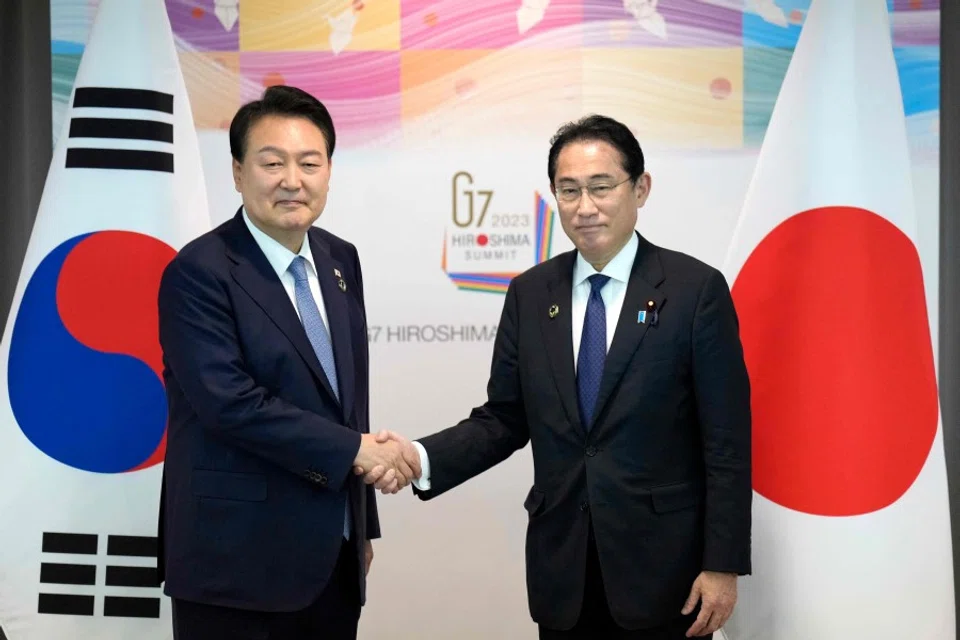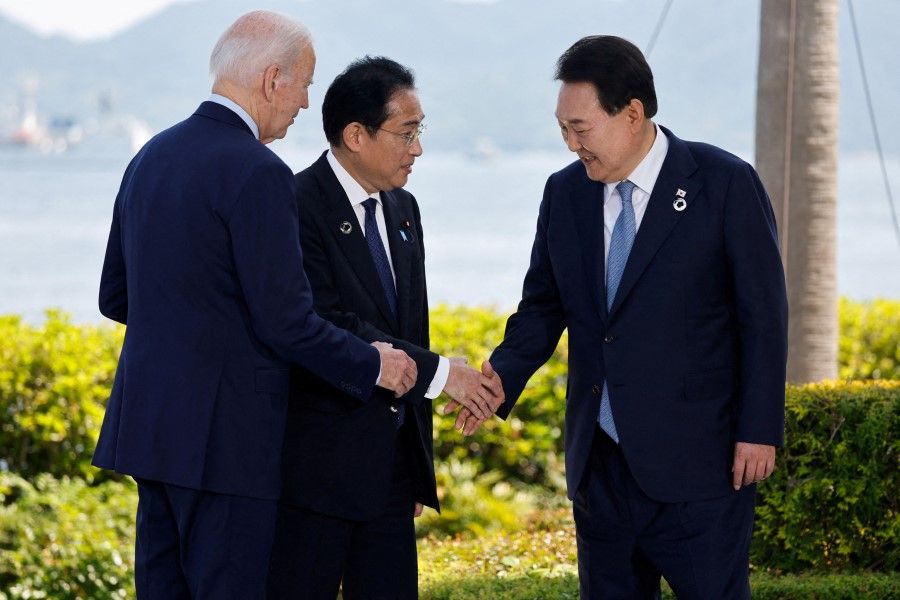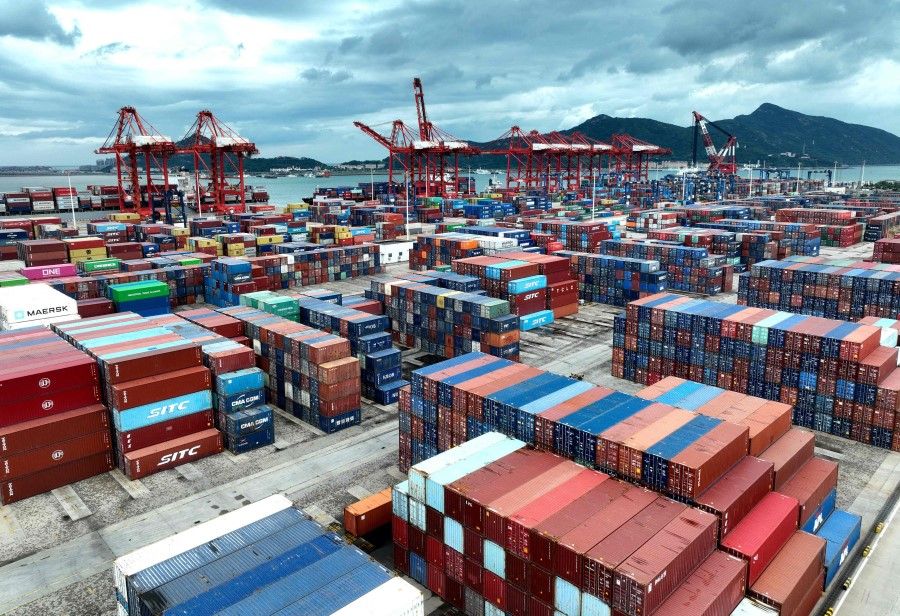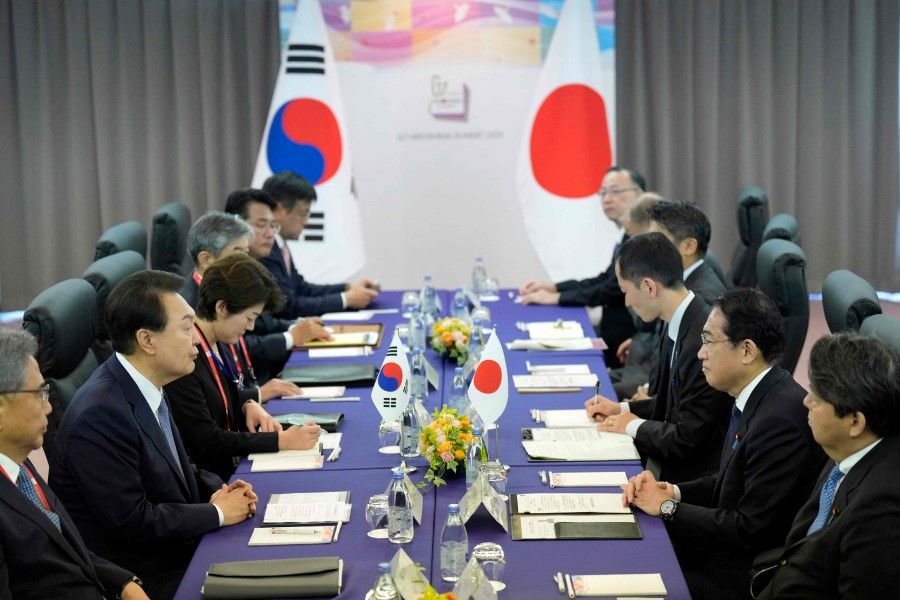Seoul-Tokyo rapprochement: Stop-gap measure or long-term goal?

The relationship between Seoul and Tokyo has seen an unusual de-escalation and even rapprochement recently, with an exchange of high-level visits and also South Korea's seeming endorsement of Japan's Fukushima treated wastewater discharge plan.
Many observers and opinion leaders believe that the China factor has a role in the thawing of South Korea-Japan relations, i.e. as both countries see China as a neighbour they need to be wary of, closer cooperation between the two countries (and with their common ally, the US) will "balance out" the influence and probably pressure from China.
US interests a catalyst
However, such reasoning may ignore a crucial factor: in the geopolitical game of East Asia, which includes China, the US, South Korea, Japan and other countries, which party benefits more from the South Korea-Japan rapprochement? The author believes that it is the US. Ahead of his June visit to China, for instance, US Secretary of State Antony Blinken spoke separately to his counterparts in Japan and South Korea, reiterating the importance of trilateral cooperation.
It could allow more opportunities for out-of-area regimes and initiatives (like the NATO) to enter Northeast Asia, hence solidifying the US's global strategic layout in a more profound, though dangerous, way.
Reconciliation of historical issues has long been the biggest obstacle to the formation of a truly close alliance between South Korea and Japan, and a key factor affecting the depth of trilateral cooperation between the US, Japan and South Korea.
Closer South Korea-Japan relations could strengthen the US-Japan-South Korea alliance and entrench the US's role in Northeast Asia's strategic position. It could allow more opportunities for out-of-area regimes and initiatives (like the NATO) to enter Northeast Asia, hence solidifying the US's global strategic layout in a more profound, though dangerous, way.

Of course, these plans cannot be separated from the "balancing", "containing" and "limiting" of China's strategic intentions and moves. However, given the current complex and delicate situation in East Asia, especially the tensions between the US and China, Seoul and Tokyo drawing closer could be reminiscent of a famous strategy of the Qin state during the Warring States period in Chinese history - 远交近攻 (yuan jiao jin gong, befriend the distant while attacking the near).
So, the question is: is the reconciliation between South Korea and Japan, which may lead to the formation of a closer triangular structure between these two countries and the US to form a "constraining" and "balancing" posture towards China, a stop-gap measure or a long-term goal for both South Korea and Japan?
In the face of the world's second largest economy, South Korea and Japan have never been able to easily detach from the Chinese market...
Long-term economic and security factors
On an economic and trade level, China remains a vital trading partner for both South Korea and Japan. For example, in 2022, South Korea's exports to China, its top trading partner, amounted to US$155.81 billion, exceeding South Korea's exports to the US, its second-largest trading partner, by nearly US$50 billion. In addition, data show that in fiscal year 2022, Japan's exports recorded 18.7030 trillion yen (US$131.98 billion) to the US, its top trading partner, and 18.5138 trillion yen to China, a similar amount.
In the face of the world's second largest economy, South Korea and Japan have never been able to easily detach from the Chinese market, and East Asian economic and trade cooperation has also been formed after decades of trials and tribulations. Thus fundamental structural adjustment can not be achieved overnight.
Meanwhile, in terms of some core technologies and key products like semiconductors, China still seeks imports and transfer of technologies from countries such as the US, Japan and South Korea. In response to US-led "technology decoupling", China has shown that it can respond by strengthening its independent research and development, and it has also announced that it will take some targeted measures of its own. For instance, it declared that as of 1 August, restrictions would be placed on gallium and germanium-related exports. Within a short period, this news generated a great deal of concern among the governments and industries of both South Korea and Japan.

At the level of the regional security situation, China plays a vital role in the peace and stability of Northeast Asia. Blinken most recently said that China needed to help with denuclearising the Korean peninsula, otherwise, it would shore up "not only our [their] own defences but also those of South Korea and Japan and a deepening of the work that all three of us are doing together".
That means that when South Korea and Japan move closer to each other by temporarily setting aside their differences, the original structure of relative regional stability will be affected.
However, it is worth noting that in retrospect, China only tried to promote the Six-Party Talks on the Korean peninsula nuclear issue as it deeply felt that the regional stability and security issues were troubling all parties, including China. This year marks the 62nd anniversary of the signing of the Treaty of Friendship, Cooperation, and Mutual Assistance between China, PRC and the Democratic People's Republic of Korea (DPRK) and, given the complex changes in the regional and international situation, China and the DPRK share a common stance in opposing hegemony and the Cold War mentality, and in resisting unilateralism in dealing with regional affairs.
That means that when South Korea and Japan move closer to each other by temporarily setting aside their differences, the original structure of relative regional stability will be affected. Even if the US-Japan-South Korea mini-trilateral structure becomes solidified, the series of consequences triggered are likely to include "predictable" reactions from China, Russia and North Korea, among others. Policymakers in South Korea and Japan will not be able to avoid these issues. In contrast, the US, an extraterritorial country, is not likely to put itself in the position of worrying too much about this for South Korea and Japan. South Korea and Japan's policymakers and opinion leaders should be aware of this.
Political expediency and domestic politics
Looking at it from the domestic politics of both countries, the Yoon Suk-yeol administration in South Korea and the Fumio Kishida administration in Japan both hold a right-wing political stance. Both take the self-reliance and self-improvement of their nations as their grand strategy and make it a critical political mission to continue expanding the influence of their own countries in the region and around the world.

Time magazine, which conducted an interview with Fumio Kishida recently, points out that Kishida has set about turning the world's No. 3 economy back into a global power with a military presence to match. On his part, South Korean President Yoon Suk-yeol recently remarked that South Korea's diplomacy, which looked only to North Korea and was looked down upon by China, has become a "global pivotal diplomacy that closely cooperates with all nations respecting international rules across five oceans and six continents". Thus, in the current domestic political contexts, the two countries seem to share similar visions of their own national development goals and thus are working together to strengthen their cooperation.
... the current reconciliation or seeming closeness between South Korea and Japan, though swift to have come about, is not without its difficulties to sustain.
However, Professor Han Sang-joon of the Department of History at Ajou University in South Korea, commented in a recent article that two obstacles prevent the improvement and development of South Korea-Japan relations. One is a territorial issue, and the other is a historical issue. Moreover, with Japan continuing to claim sovereignty over Liancourt Rocks - or Dokdo Islands or Takeshima Islands - and maintaining its current perception of colonial rule, a real reconciliation between South Korea and Japan seems impossible. He added that the situation in which the trust and national interests of South Korea and Japan deviate and conflict fundamentally limits the development of future-oriented South Korea-Japan relations.
Thus, the current reconciliation or seeming closeness between South Korea and Japan, though swift to have come about, is not without its difficulties to sustain. Moreover, China's political determination to oppose the promotion of a new round of Cold War confrontation in Northeast Asia and even the entrance of NATO in Asia is firm. A divided, antagonistic Northeast Asian region, especially with the intervention of external actors, will hardly realise real peace and stability. It can only serve the geopolitical interests of an extraterritorial power.
